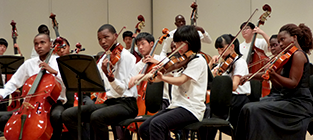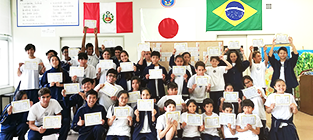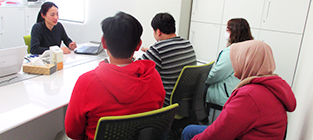The Japan Foundation Prizes for Global Citizenship (2021)
Awardees (in geographical order)
Friends of El Sistema Japan
- Representative
- KIKUGAWA Yutaka
- Year of Establishment
- 2012
- Website
- https://www.elsistemajapan.org/
- Social Media Accounts
- https://www.facebook.com/elsistemajapan/

Activity Outline
Children affected by the Great East Japan Earthquake and the nuclear disaster can restore their dignity and develop self-esteem through music. Believing in this ideal, the Friends of El Sistema Japan commenced activities in Soma City, Fukushima Prefecture, in 2012 and then in Otsuchi Town, Iwate Prefecture, in 2014 in cooperation with local governments, public organizations and private community groups. We subsequently began operating in Komagane City, Nagano Prefecture, in 2017 with the goal of addressing disparities in access to cultural and artistic activities in Japan. We also administer programs in Tokyo to provide opportunities for free self-expression to anyone regardless of disability.
Reasons for the Prize
Helping children develop their confidence through music
El Sistema is a music education program in the form of orchestras that was originally founded in Venezuela to tackle social issues such as poverty. Friends of El Sistema Japan was established in Soma City, Fukushima Prefecture, to give hope to children who lost a sense of normalcy as a result of the Great East Japan Earthquake and the nuclear disaster in 2011. Since then, with additional programs in Otsuchi Town, Iwate Prefecture, and Komagane City, Nagano Prefecture, many of its activities have been expanded to include such initiatives as collaborative concerts and practice sessions for orchestras and choirs with children's groups overseas. Its main purpose is to help children become more confident through connecting with the outside world through music and also to help invigorate local communities.
Comments from the Awardee
We would like to share the joy of receiving the Japan Foundation Prize for Global Citizenship with all the supporters of our activities. Just 10 years ago, we were wondering about what the Friends of El Sistema Japan could do to develop a future for children affected by the disaster. We were short of funds. There were no guarantees that we would achieve our goals. Despite this, we had the support of highly motivated community members and domestic and international supporters, for which we are immensely grateful. We will continue to work to achieve our goals.
Mundo de Alegria
- Representative
- MATSUMOTO Masami
- Year of Establishment
- 2003
- Website
- http://www.mundodealegria.org/index.html
- Social Media Accounts
- https://www.facebook.com/Colégio-Mundo-de-Alegria-110320977183255/

Activity Outline
"Give the joy of learning to all children—No borders for education" was our small ambition that triggered many activities. We met Hispanic children who came to Japan with their parents working away from home. They could not keep up with their classes because of the language barrier. There were also children who were unable to communicate with their own parents because they lacked a sufficient command of their mother language. Their parents asked us to open a school where education was provided in their mother language. This led to the establishment of Mundo de Alegria.
The children were required to attend ordinary Japanese schools even though they did not understand the language. Besides, they became unable to read or write in their mother language as they had no chance to learn it. Consequently, they dropped out of school, becoming delinquents, losing sight of their hopes and dreams and being unable to realize their potential.
We want them to be happy living in Japan. Our motto is to develop rich minds through education based on their mother language to prepare children to be able to live independently in society through Japanese-based education. As such, our goal is to provide education that allows them to be independent in Japanese society without being isolated and to enable them to have a vision for the future. They can complete their studies in their mother tongue and learn Japanese as their second language. After graduation, it is up to them to decide what to do with their lives, whether it be to receive a higher education or make a career choice in Japan or their home countries.
After two years since we opened the Mundo de Alegria for Hispanic children, we set up Brazilian courses at the request of Brazilian parents. Many graduates have proceeded on to higher education in Japan, their home countries and the United States. They are working to achieve their potential. Some are studying hard to become medical doctors in their home countries, while others are receiving education at Japanese universities to become elementary school teachers in Japan. There are also graduates who are pursuing their careers.
The students and graduates thanked us for establishing the school. That has supported us during very trying times. Children are resources and the treasure of the earth. We will remain committed to protecting children's futures.
Reasons for the Prize
Fostering "double advantage" individuals who can build bridges across different nationalities and generations
Hamamatsu City in Shizuoka Prefecture is home to a large number of second- and third-generation people of Japanese descent from Latin America, who largely support the manufacturing sector in the area. They have been working, raising a family and living as members of the local community for a long time, but when it comes to providing their children with good public education, they encounter a bigger hurdle at school than in the work environment due to the language barrier, often putting their children in a difficult position as a result. To tackle this problem, one Japanese woman from the city established a school called Mundo de Alegria. It has been providing education for children from kindergarten to high school both in Japanese and languages of the country of their origin, as well as assisting students with higher education and job seeking opportunities in order for them to support themselves for a brighter future. Consequently, it plays an important role in the community by working on the development of a diverse society regardless of nationalities and generations.
Comments from the Awardee
Thank you very much for the honor. I feel the endeavors of all the teachers have paid off and the significance of our existence has been acknowledged for the children from South America who come to the school. True to the name Mundo de Alegria, we saw the world of pleasure. As global citizens, we will be happy and have peace of mind if we are able to live peacefully, safely and harmoniously on Earth. As a winner of the award, we will further make our utmost efforts to realize our goal of enabling all children to enjoy learning.
Door to Asylum Nagoya
- Representative
- NAJIMA Akio
- Year of Establishment
- 2012
- Website
- https://www.door-to-asylum.jp/
- Social Media Accounts
- https://ja-jp.facebook.com/door.to.asylum/

Activity Outline
Door to Asylum Nagoya (DAN) supports refugees living in the Tokai region so that they can be legally protected and lead stable, independent lives.
DAN was founded in 2012 because the number of people applying for refugee status rapidly grew at the Nagoya Regional Immigration Services Bureau. It was registered as a specified nonprofit corporation in the following year.
Our activities mainly consist of 1) providing individual support for refugees/asylum seekers (legal support and support for living and settlement); 2) building a network supporting refugees; and 3) increasing awareness of refugee issues.
Many of the refugees in Japan, having been local leaders in their home countries and activists working to preserve the rights of minorities, possess a clear idea of what a society should be, have strong beliefs and take action. However, due to their status, refugees tend to be isolated because they are afraid of being persecuted by others from their own country even in the host country, which hinders them from establishing close relationships.
Other concerns include language barriers and issues related to Japanese immigration law such as the unstable status of residence during the long-term process of applying for asylum. Additionally, cultural barriers exist between refugees and Japanese society where they seek protection.
DAN supports each refugee living in the Tokai region. The fundamental goal of our activities is to provide legal assistance to people applying for asylum with the help of lawyers and other professionals.
Our second challenge is to support asylum seekers, who tend to be placed in a vulnerable position. By Japanese law, asylum seekers are automatically granted unofficial residency status upon entry into Japan; however, they are not entitled to a social safety net. In addition, for the past two years since the COVID-19 pandemic began, some immigrants have lost jobs even if they have resident status or a work permit. More have been laid off without health insurance or work permits, thus falling into poverty. DAN provides emergency support to protect their livelihoods in cooperation with other local organizations.
The third pillar of DAN's activities is to increase awareness of refugee issues from the viewpoint of going beyond protecting refugees to create a better, multicultural society in the future. We seek to do this by sharing information in various formats on issues in Japanese society revealed through the support of individual refugees.
Reasons for the Prize
Only NPO in the Tokai Region providing support to refugees and asylum seekers
Door to Asylum Nagoya was established in 2012 by local lawyers, university professors and other individuals who had been trying to provide support to refugees and asylum seekers with long-term assistance for legal and administrative procedures as well as issues in daily life before, during and after their application for refugee status. This is the only such NPO for refugees in the Tokai Region. Its support involves not only legal procedures but also over 1,000 consultancy cases a year to those refugees with no social security. In addition, through repeated discussions with them about their concerns, the NPO offers a wide range of activities, including distributing provisions through a food bank and helping them settle in local communities after refugee status is granted. With a rapid increase in the number of consultations with refugees who are having a very tough time due to the COVID-19 pandemic, in recent years the NPO has been focusing more on awareness-raising activities in the local community regarding refugee-related issues, which has in turn facilitated widespread efforts to support refugees through the collaboration of more diverse players.
Comments from the Awardee
Thank you very much for presenting the Japan Foundation Prize for Global Citizenship to our organization. We will share this honor with the refugees living in the Tokai region, the local support groups, lawyers and individuals working together and supporting our refugee relief efforts, in addition to our officers and staff. As global citizens, we will work to help asylum seekers and continue to endeavor to establish a better society.
- What We Do Top
- Arts and Cultural Exchange [Culture]
-
Japanese-Language Education Overseas [Language]
- Japanese-Language Education Overseas [Language] Top
- Learn Japanese-language
- Teach Japanese-language
- Take Japanese-Language Test
- Know about Japanese-language education abroad
- The Japanese-Language Institute, Urawa
- The Japanese-Language Institute, Kansai
- Japanese-Language Programs for Foreign Specified Skilled Worker Candidates
- Japanese Language Education for Japanese Children Resident Overseas and for the Descendants of Migrants
- Archives
- Japanese Studies and Global Partnerships [Dialogue]
- JF digital collection
- Other Programs / Programs to Commemorate Exchange Year
- Awards and Prizes
- Publications
